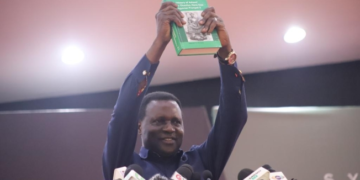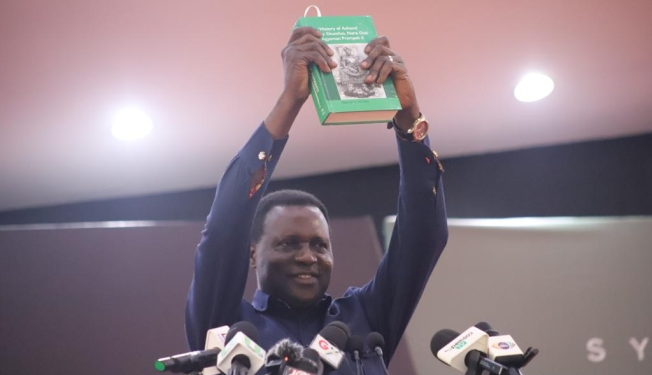In a significant milestone for the cultural heritage of Asanteman, a long-awaited autobiography chronicling the history of the revered kingdom authored by the late Otumfuo Sir Osei Agyeman Prempeh II has been unveiled. The launch ceremony took place in Kumasi, marking over five decades since the passing of the esteemed monarch.
Titled “History of Asanteman,” the book offers a firsthand account of the kingdom’s evolution under the reign of the 14th Asantehene, who held the throne from 1931 to 1970. Edited by Professor Tom McCastie, an eminent scholar specializing in Asante history at the Centre of West African Studies of the University of Birmingham, the publication promises a comprehensive insight into the rich heritage and traditions of Asante.
The book launch formed part of activities marking the 150th commemoration of the Sagrenti War and the silver jubilee of the Asantehene Otumfuo Osei Tutu II.
Addressing the audience, the Minister of Education, Dr. Yaw Osei Adutwum, hailed the significance of the book in bridging the gaps in Ashanti history and providing a vital resource for academic research. He underscored the uniqueness of the publication, emphasizing that while previous works have explored aspects of Asante history, none have matched the depth and breadth offered by the late Otumfuo’s narrative, meticulously curated by Professor McCastie.
Dr. Adutwum urged authors of children’s literature to consider creating simplified versions of the autobiography, ensuring that future generations can engage with and appreciate the rich cultural heritage embedded within its pages. He advocated for widespread accessibility of the book, suggesting that it should find a place on the shelves of every library across the country.
Prior to the book launch, there was a symposium on the 150th anniversary of the Sagrenti War which was fought between the British Colonial Army and the Asantes.
The Kumasi Centre for National Culture staged a play written by Emmanuel Jewel Peprah Mensah to depict the Sagrenti War.
The stage play was to give the audience an idea about the war that happened and the wreck it left in its wake.
Sharing his views on the war, Prof McCastie said aside from the royal ornaments that were stolen from the palace, the British soldiers also looted gold and gold dust kept by the then Asantehene Otumfuo Kofi Karikari.
He explained that the value of the gold stolen by the British army could be worth more than £2billion.
Prof McCastie said some of the items stolen from the palace were still on display in museums in the UK and cited a brass basin used for spiritual cleaning which is still at the Military Museum in London.

He said the growing supremacy of the then Asante Confederacy posed a threat to the British colonialists who had to seek the support of other tribes to enable them to conquer the Asante.
For her part, a discussant at the symposium, Prof Eugenia Anderson of the History and Political Studies Department of the Kwame Nkrumah University of Science and Technology (KNUST) eulogised the contributions of Asante women in the war and the sustenance of the Asante kingdom.
She said although women of child bearing age did not play much role at the frontline of the war due to socio-cultural barriers, those advanced in age were allowed to play an active role in the socio-political life of the kingdom.
Prof Anderson cited the role played by three Asante queenmothers, namely Afia Kobi, Nana Yaa Akyaa and Yaa Asantewaa.
She said these women were very instrumental in protecting the golden stool.


































